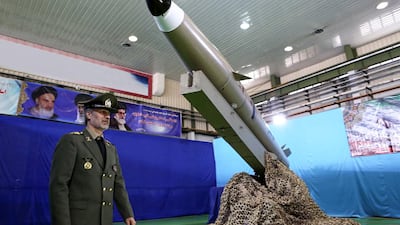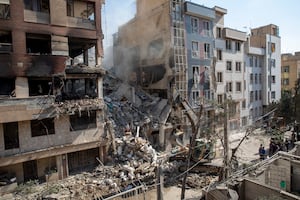Veterans of the Iran-Iraq war are among those replacing the Iranian commanders killed in Israel’s attacks, as experts warn the force could soon start filling its top ranks with a younger generation of hardliners.
The latest appointments are Maj Gen Amir Hatami as chief commander of the Iranian army, and Brig Gen Majid Mousavi, who becomes commander of the Islamic Revolutionary Guard Corps' aerospace force, Iranian state news agency Irna reported on Saturday.
Mr Hatami served as defence minister from 2013 to 2021. He will replace Maj Gen Seyyed Abdulrahim Mousavi who will now lead the Iranian military as its chief of staff. Maj Gen Mousavi's predecessor, Mohammad Bagheri, was killed in the Israeli air strikes on Friday.
The new commander-in-chief of the elite Islamic Revolutionary Guard Corps is Brig Gen Mohammad Pakpour, who threatened to open “the gates of hell” in retaliation for Israel’s attacks. He joined the IRGC after the 1979 revolution, in which he fought armed groups in the Kurdistan region.
“In retribution for the blood of our fallen commanders, scientists and citizens, the gates of hell will soon be opened upon this child-killing regime,” he said upon assuming the role on Friday.
Iranian army spokesman Brig Gen Abolfazl Shekarchi said the four newly appointed commanders “will advance the path of their predecessors with full power”.
Lessons from the Iran-Iraq war
The eight-year war between Iran and Iraq shaped the Iranian military system, and its veterans are likely to draw lessons from there.
Maj Gen Hatami was part of the volunteer Basij forces during the conflict and was honoured for his pushback against the dissident militant group Mojahedin e-Khalq (MEK). Maj Gen Mousavi is also said to have played a leading role in the 1980s conflict.
Brig Gen Pakpour commanded frontline divisions during the Iran-Iraq war, including the elite 8th Najaf Ashraf and 31st Ashura units, where he was wounded in combat, according to Iranian news network Press TV.
“The old generation of Guards is very ideological, but it is also risk-averse because it knows the devastation of war,” said Hamidreza Azizi, a visiting fellow at the German Institute for International and Security Affairs.
The Iran-Iraq war equipped the Iranian military to replace its top brass at speed. “This is a system that endured the war with Iraq. They have been prepared for such a scenario,” Mr Azizi told The National.
The dwindling number of veterans, however, could pave the way “step-by-step” for a new generation of military leaders who will take a more gung-ho approach to combat, and be less willing to come to the negotiating table, Mr Azizi fears.
“If the Islamic Republic can survive this war we will see a totally new creation in terms of hardliners,” he said.
Dwindling chain of command
Six high-ranking commanders are believed to have been killed on Friday, including the head of the IRGC Hossein Salami.
The IRGC's aerospace force – which handles Iran’s missiles – was the hardest hit, losing its commander, Brig Gen Amir Ali Hajizadeh, alongside 20 other senior officers who had convened for a meeting.
The Guards will struggle to replace the aerospace force losses due to the large number of high-ranking officers killed, Mr Azizi said.
Two deputy commanders of the Iranian army were also killed in the Israeli attacks, Iranian state media reported on Saturday, without naming them or the time of their deaths.
Esmail Qaani, the leader of the Quds Force – a branch of the IRGC that supports Iran’s regional proxies – is also reported to have been killed on Friday, but no replacement has been announced yet.
'Spies in Disguise'
Director: Nick Bruno and Troy Quane
Stars: Will Smith, Tom Holland, Karen Gillan and Roshida Jones
Rating: 4 out of 5 stars
'Texas Chainsaw Massacre'
Rating: 1 out of 4
Running time: 81 minutes
Director: David Blue Garcia
Starring: Sarah Yarkin, Elsie Fisher, Mark Burnham
The Voice of Hind Rajab
Starring: Saja Kilani, Clara Khoury, Motaz Malhees
Director: Kaouther Ben Hania
Rating: 4/5
Rebel%20Moon%20-%20Part%20One%3A%20A%20Child%20of%20Fire
%3Cp%3E%3Cstrong%3EDirector%3A%20%3C%2Fstrong%3EZack%20Snyder%3Cbr%3E%3Cstrong%3EStars%3A%20%3C%2Fstrong%3ESofia%20Boutella%2C%20Djimon%20Hounsou%2C%20Ed%20Skrein%2C%20Michiel%20Huisman%2C%20Charlie%20Hunnam%3Cbr%3E%3Cstrong%3ERating%3A%20%3C%2Fstrong%3E2%2F5%3C%2Fp%3E%0A
SPECS
%3Cp%3E%0D%3Cstrong%3EEngine%3A%3C%2Fstrong%3E%204.0-litre%20twin-turbo%20V8%0D%3Cbr%3E%3Cstrong%3EPower%3A%3C%2Fstrong%3E%20750hp%20at%207%2C500rpm%0D%3Cbr%3E%3Cstrong%3ETorque%3A%3C%2Fstrong%3E%20800Nm%20at%205%2C500rpm%0D%3Cbr%3E%3Cstrong%3ETransmission%3A%3C%2Fstrong%3E%207%20Speed%20dual-clutch%20auto%0D%0D%3Cbr%3E%3Cstrong%3ETop%20speed%3A%3C%2Fstrong%3E%20332kph%0D%3Cbr%3E%3Cstrong%3EFuel%20consumption%3A%3C%2Fstrong%3E%2012.2L%2F100km%0D%3Cbr%3E%3Cstrong%3EOn%20sale%3A%20%3C%2Fstrong%3EYear%20end%0D%3Cbr%3E%3Cstrong%3EPrice%3A%3C%2Fstrong%3E%20From%20Dh1%2C430%2C000%20(coupe)%3B%20From%20Dh1%2C566%2C000%20(Spider)%3C%2Fp%3E%0A
UAE currency: the story behind the money in your pockets
Company profile
Name: Tratok Portal
Founded: 2017
Based: UAE
Sector: Travel & tourism
Size: 36 employees
Funding: Privately funded
The specs: 2018 BMW X2 and X3
Price, as tested: Dh255,150 (X2); Dh383,250 (X3)
Engine: 2.0-litre turbocharged inline four-cylinder (X2); 3.0-litre twin-turbo inline six-cylinder (X3)
Power 192hp @ 5,000rpm (X2); 355hp @ 5,500rpm (X3)
Torque: 280Nm @ 1,350rpm (X2); 500Nm @ 1,520rpm (X3)
Transmission: Seven-speed automatic (X2); Eight-speed automatic (X3)
Fuel consumption, combined: 5.7L / 100km (X2); 8.3L / 100km (X3)
UAE currency: the story behind the money in your pockets
Quick pearls of wisdom
Focus on gratitude: And do so deeply, he says. “Think of one to three things a day that you’re grateful for. It needs to be specific, too, don’t just say ‘air.’ Really think about it. If you’re grateful for, say, what your parents have done for you, that will motivate you to do more for the world.”
Know how to fight: Shetty married his wife, Radhi, three years ago (he met her in a meditation class before he went off and became a monk). He says they’ve had to learn to respect each other’s “fighting styles” – he’s a talk it-out-immediately person, while she needs space to think. “When you’re having an argument, remember, it’s not you against each other. It’s both of you against the problem. When you win, they lose. If you’re on a team you have to win together.”
Ballon d’Or shortlists
Men
Sadio Mane (Senegal/Liverpool), Sergio Aguero (Aregentina/Manchester City), Frenkie de Jong (Netherlans/Barcelona), Hugo Lloris (France/Tottenham), Dusan Tadic (Serbia/Ajax), Kylian Mbappe (France/PSG), Trent Alexander-Arnold (England/Liverpool), Donny van de Beek (Netherlands/Ajax), Pierre-Emerick Aubameyang (Gabon/Arsenal), Marc-Andre ter Stegen (Germany/Barcelona), Cristiano Ronaldo (Portugal/Juventus), Alisson (Brazil/Liverpool), Matthijs de Ligt (Netherlands/Juventus), Karim Benzema (France/Real Madrid), Georginio Wijnaldum (Netherlands/Liverpool), Virgil van Dijk (Netherlands/Liverpool), Bernardo Silva (Portugal/Manchester City), Son Heung-min (South Korea/Tottenham), Robert Lewandowski (Poland/Bayern Munich), Roberto Firmino (Brazil/Liverpool), Lionel Messi (Argentina/Barcelona), Riyad Mahrez (Algeria/Manchester City), Kevin De Bruyne (Belgium/Manchester City), Kalidou Koulibaly (Senegal/Napoli), Antoine Griezmann (France/Barcelona), Mohamed Salah (Egypt/Liverpool), Eden Hazard (BEL/Real Madrid), Marquinhos (Brazil/Paris-SG), Raheem Sterling (Eengland/Manchester City), Joao Félix(Portugal/Atletico Madrid)
Women
Sam Kerr (Austria/Chelsea), Ellen White (England/Manchester City), Nilla Fischer (Sweden/Linkopings), Amandine Henry (France/Lyon), Lucy Bronze(England/Lyon), Alex Morgan (USA/Orlando Pride), Vivianne Miedema (Netherlands/Arsenal), Dzsenifer Marozsan (Germany/Lyon), Pernille Harder (Denmark/Wolfsburg), Sarah Bouhaddi (France/Lyon), Megan Rapinoe (USA/Reign FC), Lieke Martens (Netherlands/Barcelona), Sari van Veenendal (Netherlands/Atletico Madrid), Wendie Renard (France/Lyon), Rose Lavelle(USA/Washington Spirit), Marta (Brazil/Orlando Pride), Ada Hegerberg (Norway/Lyon), Kosovare Asllani (Sweden/CD Tacon), Sofia Jakobsson (Sweden/CD Tacon), Tobin Heath (USA/Portland Thorns)
GROUP RESULTS
Group A
Results
Ireland beat UAE by 226 runs
West Indies beat Netherlands by 54 runs
Group B
Results
Zimbabwe tied with Scotland
Nepal beat Hong Kong by five wickets
SERIE A FIXTURES
Saturday
AC Milan v Sampdoria (2.30pm kick-off UAE)
Atalanta v Udinese (5pm)
Benevento v Parma (5pm)
Cagliari v Hellas Verona (5pm)
Genoa v Fiorentina (5pm)
Lazio v Spezia (5pm)
Napoli v Crotone (5pm)
Sassuolo v Roma (5pm)
Torino v Juventus (8pm)
Bologna v Inter Milan (10.45pm)
How to donate
Send “thenational” to the following numbers or call the hotline on: 0502955999
2289 – Dh10
2252 – Dh 50
6025 – Dh20
6027 – Dh 100
6026 – Dh 200
More from Armen Sarkissian
Results
2pm: Serve U – Maiden (TB) Dh60,000 (Dirt) 1,400m; Winner: Violent Justice, Pat Dobbs (jockey), Doug Watson (trainer)
2.30pm: Al Shafar Investment – Conditions (TB) Dh100,000 (D) 1,400m; Winner: Desert Wisdom, Bernardo Pinheiro, Ahmed Al Shemaili
3pm: Commercial Bank of Dubai – Handicap (TB) Dh68,000 (D) 1,200m; Winner: Fawaareq, Sam Hitchcott, Doug Watson
3.30pm: Shadwell – Rated Conditions (TB) Dh100,000 (D) 1,600m; Winner: Down On Da Bayou, Xavier Ziani, Salem bin Ghadayer
4pm: Dubai Real Estate Centre – Maiden (TB) Dh60,000 (D) 1,600m; Winner: Rakeez, Patrick Cosgrave, Bhupat Seemar
4.30pm: Al Redha Insurance Brokers – Handicap (TB) Dh78,000 (D) 1,800m; Winner: Capla Crusader, Bernardo Pinheiro, Rashed Bouresly






